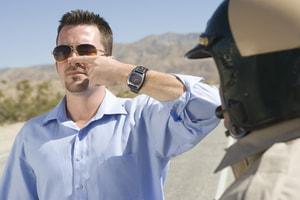Four Reasons Why Field Sobriety Tests Are Unreliable Evidence
 The name “field sobriety test” makes these exercises sound more official and clinical than they actually are. FSTs help police officers guess whether a driver may be impaired by using subjective exercises, such as the horizontal gaze nystagmus, walk-and-turn exercise, and one-leg stand. An experienced criminal defense attorney has many ways to refute the results of an FST if the prosecution tries to use them as evidence in a driving under the influence case. The defenses center around the many flaws with FSTs:
The name “field sobriety test” makes these exercises sound more official and clinical than they actually are. FSTs help police officers guess whether a driver may be impaired by using subjective exercises, such as the horizontal gaze nystagmus, walk-and-turn exercise, and one-leg stand. An experienced criminal defense attorney has many ways to refute the results of an FST if the prosecution tries to use them as evidence in a driving under the influence case. The defenses center around the many flaws with FSTs:
- FSTs Are Naturally Subjective: The accuracy of a test depends on a consistent application of the test and measurable results. Officers use FSTs as suggested exercises to help make judgments. They have discretion in the ways they administer FSTs and can draw different conclusions from the same results, depending on their experience and training. FSTs are not meant to provide empirical evidence of a person’s intoxication.
- The Subject Does Not Have a Baseline Result for the FST: An officer conducting an FST is looking for universal symptoms that suggest impairment. However, the officer is assuming how the subject would perform on the test under normal circumstances. A person’s normal physical condition will affect his or her ability to walk straight or maintain his or her balance.
- Many Factors Can Affect an FST: Subjects do not perform an FST in a controlled environment that allows for unbiased results. The levelness of the ground and the time of the day can both affect how someone performs. A subject may have more difficulty maintaining his or her balance on a sloped surface or seeing where he or she is walking when it is dark. The subject is also likely to be tired because most DUI stops occur at night.
- The Subject Is Feeling Stressed: An officer may misinterpret confusion or mistakes during an FST as signs of impairment by the driver. The subject is likely nervous because of the traffic stop, even if he or she is not under the influence of an intoxicating substance. Stress distracts people when they are listening to instructions and can cause them to make mistakes that they normally would not make.
Dealing with FST Results
You should not agree to take an FST, and police cannot require you submit to one. You would risk providing evidence for a DUI case against you. An officer may choose to arrest you on suspicion of DUI if you refuse an FST, but the prosecution must provide other evidence of the offense. A San Francisco DUI defense attorney at Burglin Law Offices, P.C., can contest your DUI charges when the prosecution lacks credible evidence. Schedule a free consultation by calling 415-729-7300.
Source:
https://www.verywellmind.com/field-sobriety-test-67159
 415-729-7300
415-729-7300




